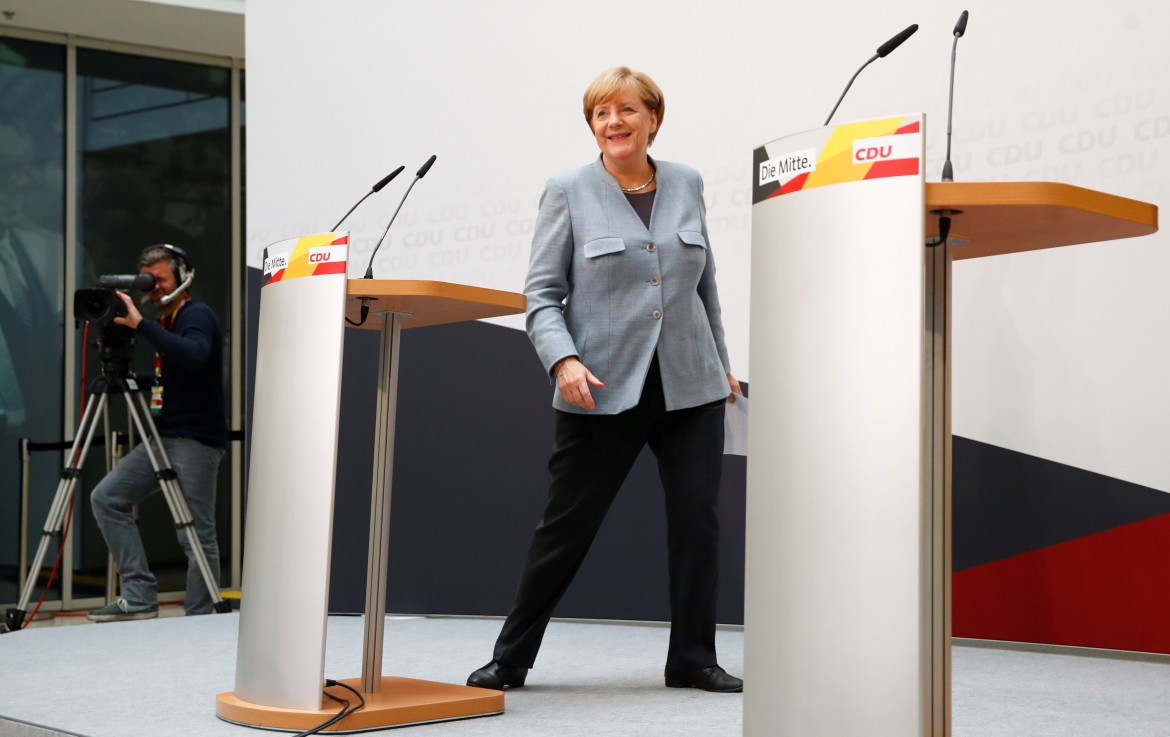Commentary
After SPD performance, a Bad Godesberg backslide
The real news generated by the electoral response is not so much the disastrous defeat of the SPD, for good or bad recorded already as a long-term trend, but its declaration not to participate in the re-issue of the Grosse Koalition, a historic life preserver of German political stability.

“Germany needs a stable government, and we will make it.” With some effort, Angela Merkel will succeed in keeping her promise in her fourth term. No one in her party has the power to make her pay for the 8 percentage points lost in this election. Not even the CSU, the CDU’s Bavarian allies, who, despite making an open complaint against the chancellor’s migration policy and maintaining a solid right-wing stance, have suffered a real collapse and risk losing the historic absolute majority in the Land.
Nevertheless, the perceived chaos is much bigger than the reality, and talking, as some do, of the “end of an era” is definitely across the line. AfD’s strong statement, somewhat above the already unpleasant voting response, actually makes an impression and will poison the social climate of the country, counting from today on a large parliamentary forum. However, for the nationalist and identity-oriented party, its political agility is clearly limited.
The authoritarian right in the Federal Republic, more or less nostalgic, has always existed, ever since the allies hastily put an end to denazification with the outbreak of the Cold War. They keep a low profile in the CDU ranks, especially in the CSU led by the hot blooded Franz Josef Strauss.
Or present in ministries, in the judiciary, in Axel Springer’s media empire, it has never stopped influencing German political life. In recent times, even in the Spd nationalistic and xenophobic positions were nested that have nothing to envy to the AfD. Just think of Berlin senator Thilo Sarrazin, author of ultra-identity and anti-Islamic best sellers.
And now that it coalesced in a 13 percent party (thanks also to the contribution of the people in the East, ill-treated by the discipline of reunification), the extreme right is not in the easiest position to exert this influence.
Already, during the victory celebrations, the AfD threatened to break into the “benign” current, centered on Frauke Petry’s “German saver,” and the angry nationalists rooted in the frustration of East European citizens. The “realists” know how difficult it will be to break the solid ad excludendum convention that lies on a party infested with frenzied demagogues and declared nostalgics who immediately step apart in positions that could prelude to a split.
Spending all their energy in the task of halting the advance of this unbridled and divided fascism has two equally negative consequences for Germans. The first is to pursue some AfD issues, in particular the restriction of right to asylum and the closure against migrants, a temptation that sneaks even in the Linke (Wagenknecht), scared by the breakthrough of the right in its electoral constituencies in east Germany.
The second in undermining, in the name of a threat to democracy, the danger that the entry of the Liberal Democrats in the future government will strengthen liberal dogmatism and the intention to subject European policy to the priority interests of Germany’s competitiveness and its financial results.
Paradoxically, this event would ultimately favor the expansion of the AfD, and above all its more radical currents, which is actually their objective.
The real news generated by the electoral response is not so much the disastrous defeat of the SPD, for good or bad recorded already as a long-term trend, but its declaration not to participate in the re-issue of the Grosse Koalition, a historic life preserver of German political stability.
By no means it is said that this unavailability is borne by the contingency shocks, the call to anti-fascist unity and the cult to the “sense of responsibility,” which is dear to the Germans.
But if it were to hold, it would require a substantial conversion of the party to an opposition culture. And it would begin, if not a true backtrack of the 1959 Bad Godesberg program (the congress in which social democracy abandoned any residual Marxism to convert to the market economy), at least a decisive renunciation of the Liberal and Anti-Social Agenda put together in 2003 by the Social Democrat Chancellor Gerhard Schroeder, which cost the party millions of votes.
It would not be enough to see a modest correction of class relations and stunted charity work in favor of the most disastrously disadvantaged or timid labor market interventions, carefully designed not to affect profits.
The consequences should be derived from working in a society with growing inequalities and social suffering, certainly lesser than elsewhere, but unbearable in such a wealthy economy.
The choice of the opposition not to allow AfD the majority representation cannot, in short, be limited to the formal safeguard of what was called the “constitutional arch” in Italy, but it should collate the reasons (not the moods) of the social protest that has taken the path to the right.
There is, however, doubt that the SPD is ready for such a change of course. Its political staff has long been accustomed to the administration of the status quo, and there is no leader figure capable of taking a decisive turn.
Although we cannot rule out that, this time, the intensity of the blow will force them to move from the long faces to a serious review of its own political history.
Originally published at https://ilmanifesto.it/alla-spd-serve-una-bad-godesberg-alla-rovescia/ on 2017-09-26
